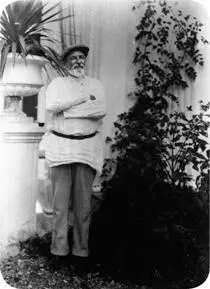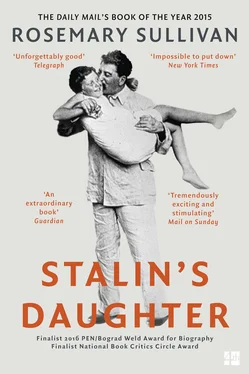Olga was a more complex figure. In 1893, she’d run off with Sergei, who was the family’s lodger, to escape her tyrannical father. She was sixteen; he was twenty-seven. She seemed a willing ally in Sergei’s revolutionary politics. Her life and the lives of her four children had been a narrative of constant moving from city to city, police searches, fear, keeping secrets, visiting Sergei in prison, and watching friends disappear. She distributed Marxist tracts, as did her young daughters, a dangerous practice that could bring them a jail term as it did their father. It was she who suggested their Saint Petersburg apartment on Rozhdestvenskaya Street as a hiding place for Lenin in the summer of 1917, when he stayed for several days before fleeing to Finland when the Revolution seemed to be dissolving, only to return to organize the Bolshevik triumph that October. And she also welcomed Stalin’s visits. Stalin was effusive in his gratitude to Olga, writing to her from his Siberian exile:
NOVEMBER 25, 1915
Olga Eugenievna:
I am more than grateful to you, dear Olga Eugenievna, for your kind and good sentiments toward me. I shall never forget the concern which you have shown me. I await the time when my period of banishment is over and I can come to Petersburg, to thank you and Sergei personally, for everything. I still have two years to complete it all. . . . My greetings to the boys and girls. . . .
Respectfully yours,
Joseph 32
This was the son-in-law who would one day betray her every trust.
As soon as her youngest daughter, Nadya, turned fourteen, Olga asserted her independence by undertaking training as a midwife. When Russia entered World War I, she joined the Red Cross, tending the wounded who arrived from the German front. She lived mostly at the hospital and, according to her son Pavel, began to take lovers.
By the time they were in residence at Zubalovo, Sergei and Olga were completely alienated. He would arrive from one end of the dacha, she from the other, and they would stare each other down across the length of the dining room table. Sergei had been sidelined as an Old Bolshevik, though he remained a fervent believer, while Olga seemed skeptical, and was the earliest to suspect the true nature of her son-in-law.
Through those long summers at the dacha, this seemed an explosive, hot-tempered, typically Georgian family—Grandpa Sergei, angry when a child was restless at the table, was known to pour his soup into the child’s lap. 33Olga had reverted to her Eastern Orthodox religion. When the Stalin children and their friends, brought up in the atheistic ideology of Communism, mocked Grandma Olga’s beliefs, she would respond, “Where is your soul? You will know when it aches.” 34However, she didn’t seem to mind the ascendency and benefits her son-in-law’s position gave her.
Svetlana, who inherited Olga’s red hair and blue eyes, identified with her grandmother. She claimed that her mother had banned her grandmother from visiting their Kremlin apartment because she resented Olga’s constant criticism of her Bolshevik devotion to her career and her failure to stay at home with her children. 35Svetlana probably picked this up from her aunts, as it is hardly the memory of a six-year-old child. Apparently Olga would shout at Nadya that she’d brought up four children, though Nadya, remembering her fractured childhood, might have found this ironic. Olga was explosive but not particularly self-reflective, traits her granddaughter Svetlana also seemed to inherit.
As a child, Svetlana would not have had much understanding of these complex family undercurrents. What child does? At Zubalovo, her grandparents, and particularly her grandfather, were benevolent parental substitutes. Sergei kept a machine shop in a separate hut at the dacha and invited the children into his workshop to play with his tools and make things. Sometimes he would hang candy from the trees for them to pluck and take them on long mushroom-picking hikes through the forest.

Svetlana’s maternal grandfather, Sergei Alliluyev, in the late 1920s.
(Svetlana Alliluyeva private collection; courtesy of Chrese Evans)
Many of the Bolshevik Party elite shared those summers at Zubalovo. Svetlana called all of them uncles. “Uncle Voroshilov” and “Uncle Mikoyan” came to the Stalin dacha with their families. One of the visitors she liked best was Stalin’s old comrade Nikolai Bukharin, who filled the dacha with laughter and was loved by everyone. He taught Svetlana’s nanny to ride a bike and always brought animals to the dacha and the Kremlin gardens: hedgehogs, garter snakes in jars, hawks, even a tame fox. Long after Stalin had Bukharin executed in the final show trial of 1938, his fox still ran through the Kremlin gardens. Other friends came, like Sergo Ordzhonikidze and his wife, Zinaida. As a six-year-old, Svetlana watched the adult parties with a child’s curiosity: Semyon Budyonny played the accordion and the adults sang Russian folk songs. Even Nadya might dance the Georgian lezghinka , and Stalin, who had an excellent singing voice and fine pitch, might also sing. 36Only Mikoyan, Budyonny, and Kliment Voroshilov outlasted Stalin. These “uncles” and “aunts” began to disappear in the mid-1930s; many were executed, and some, like Ordzhonikidze, committed suicide. Svetlana remembered only that, as a child, she couldn’t understand where everybody had gone. People simply “vanished.” No one explained why. 37
Stalin was forty-eight when Svetlana was born, and he preferred his vacations without noisy children. He and Nadya often took vacations in Sochi on the Black Sea, where the warm baths helped his rheumatism, in all likelihood a product of his numerous Siberian exiles. It seemed that often a whole retinue of Party members would drive south in a flotilla of cars. Svetlana kept her mother’s photographs of those trips. There was the image of Abel Enukidze, her mother’s beloved godfather, at picnics on the beach. Other Politburo members, like Molotov, Mikoyan, and Voroshilov, would be there. Taking vacations together was part of Party orthodoxy. Stalin had a deformed arm as a result of childhood accidents, as well as webbed toes on one foot, so he never swam. He preferred to stretch out on a deck chair on the beach reviewing documents. Svetlana was five years old before she was allowed to accompany her parents to their dacha in Sochi.
Looking back in her memoir, written when she was thirty-seven, Svetlana could speak only of these leaders’ “deaths,” not of their murders. “I want to put down only what I know and what I remember and saw myself,” is how she keeps the psychological trauma at a distance. 38But here the split begins: Zubalovo was once a place of light and magic where old friends, revolutionary comrades, gathered to share summers and laughter with their children. And then everything turned murderously black.
In retrospect Svetlana would not deny the paradox of that childhood happiness. Its privileged isolation protected her from the terrible suffering of the time: the brutal internal Party struggles as Stalin asserted his ascendency over his rivals with purges of Old Bolsheviks and the Party elite; the deaths of millions of peasants from man-made famines caused by forced collectivization in the countryside in the name of rapid industrialization. The classless Bolsheviks had replicated the tsarist regime: now the people were the serfs and the leaders walled themselves within safe boundaries. There were not then the bourgeois excesses that the regime would become famous for after the war.
Nor could Svetlana deny the magic of that first world, when she lived with the timeless unconsciousness of a child in a place peopled with beings she loved. Should she merely have rejected this whole world? But she was at the core of a paradox. How could a world that seemed wonderful be also terrible? Her father petted and loved her and showered her with paternal tobacco kisses as, at her nanny’s urging, she trotted up to him with presents of violets and strawberries. How could he already be at the same time one of the world’s bloodiest dictators, biding his time?
Читать дальше












![John Bruce - The Lettsomian Lectures on Diseases and Disorders of the Heart and Arteries in Middle and Advanced Life [1900-1901]](/books/749387/john-bruce-the-lettsomian-lectures-on-diseases-and-disorders-of-the-heart-and-arteries-in-middle-and-advanced-life-1900-1901-thumb.webp)
